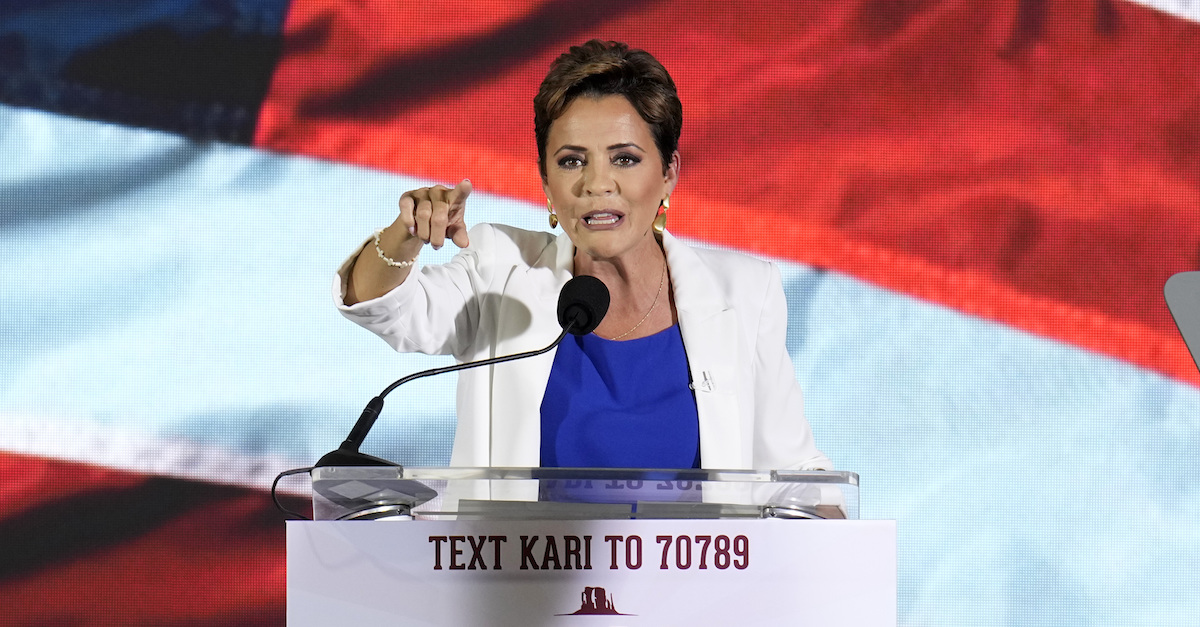
Republican candidate Kari Lake announces her plans to run for the Arizona U.S. Senate seat during a rally, Tuesday, Oct. 10, 2023, in Scottsdale, Ariz. (AP Photo/Ross D. Franklin)
Failed 2020 Arizona gubernatorial candidate Kari Lake (R) lost out on Monday in a bid to ban electronic voting machines in the Grand Canyon State’s 2022 midterms — and an appellate court footnote noted that the pro-Donald Trump Cyber Ninjas audit worked against her claims.
The dismissed lawsuit, which previously led to sanctions against the lawyers who brought it for making “false, misleading, and unsupported factual assertions,” was noticed for appeal to U.S. Court of Appeals for the Ninth Circuit in July. Arguments followed on Sept. 12 and the opinion affirming dismissal dropped just over month month later.
U.S. Circuit Judges Ronald Gould, a Bill Clinton appointee, Andrew Hurwitz, a Barack Obama appointee, and Patrick Bumatay, a Donald Trump appointee, heard and decided the case. Notably, the appellate court’s opinion was per curiam, written by no judge in particular but on behalf of each of them — and with no disagreement.
Lake’s lawsuit, joined by filed Arizona Secretary of State candidate Mark Finchem (R), had asserted that “[j]ust as the government cannot insist on ‘trust me,’ so too, private companies that perform governmental functions, such as vote counting, cannot be trusted without verification.” But the appellate panel flipped that argument on its head by agreeing that “speculative allegations” do not equal standing to sue.
“Plaintiffs’ candidacies failed at the polls, and their various attempts to overturn the election outcome in state court have to date been unavailing. On appeal, they no longer seek any relief concerning the 2022 election, but instead seek to bar use of electronic tabulation systems in future Arizona elections,” the panel said. “We agree with the district court that Plaintiffs’ ‘speculative allegations that voting machines may be hackable are insufficient to establish an injury in fact under Article III.””
The circuit judges emphasized that Lake’s appeal did not focus on “past harm” and was “limited to potential future hacking.” Nor did Lake “contend that any electronic tabulation machine in Arizona has ever been hacked.”
Read Related Also: 'Super mafia' fears as Italy's three powerful mobs 'seen sharing meal'
“Although Plaintiffs contend that the use of electronic tabulation systems denies them a ‘fundamental right’ to vote, they do not allege that the State has in any way burdened their individual exercise of the franchise,” the per curiam opinion continued.
In a footnote pointing to the Cyber Ninjas audit in Maricopa County that confirmed President Joe Biden’s 2020 election win, the panel commented on Lake’s assertion of a “constitutional right to a certain level of accuracy in the Arizona tabulation system,” saying that claim “plainly fails” in this instance.
“Plaintiffs cite the ‘Cyber Ninjas’ hand-count audit of Maricopa County votes in 2020 authorized by the Arizona Senate,” the footnote said. “But, they overlook the audit report’s conclusion that ‘there were no substantial differences between the hand count of the ballots provided and the official election canvass results for Maricopa County.’”
The judges concluded that the “precise nature of Plaintiffs’ claimed injury is not clear” and that they “simply have not plausibly alleged a ‘real and immediate threat of’ future injury.”
“In the end, none of Plaintiffs’ allegations supports a plausible inference that their individual votes in future elections will be adversely affected by the use of electronic tabulation, particularly given the robust safeguards in Arizona law, the use of paper ballots, and the post-tabulation retention of those ballots,” the court said. “The district court correctly dismissed the operative complaint for lack of Article III standing.”
Read the opinion here.
Have a tip we should know? [email protected]





